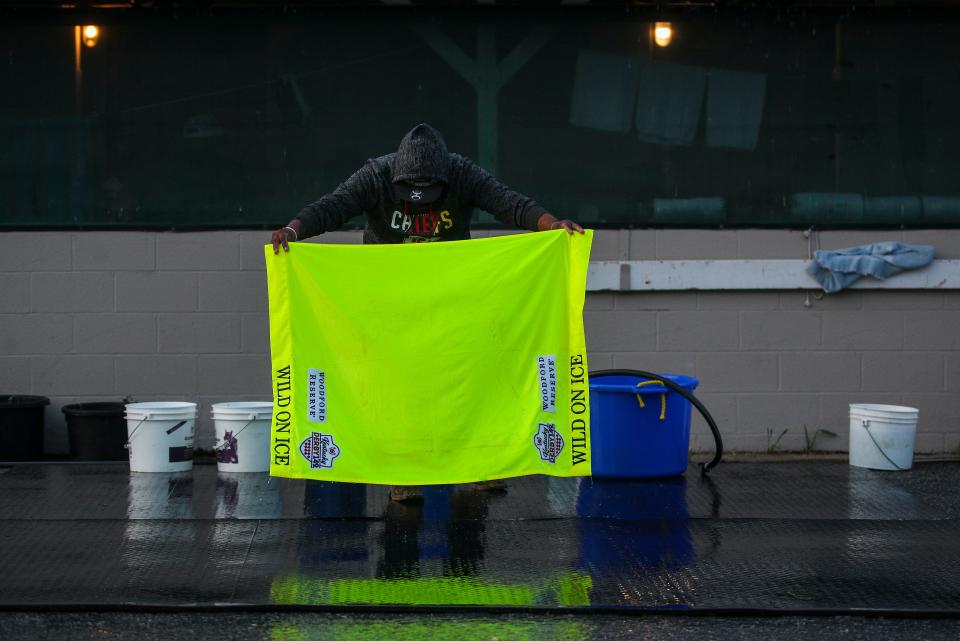Ahead of Kentucky Derby, 4 horses died at Churchill Downs. Make horse welfare a priority.
A lifelong resident of Louisville, I often find myself explaining the magic of the Kentucky Derby to fellow animal-welfare advocates and other skeptics of the industry. Increasing numbers of them tend to reduce horseracing to a matter of on-track and off-track injuries and deaths and conclude that in a world with an explosion of gambling options, horse racing is obsolete and downright dangerous for the animals.
If you are from here, too, you already get it. There is something alchemical about the break into springtime weather, the sepia-toned traditions of heading to the track in fancy duds and sipping Mint Juleps, and the steamy snorts of powerful Thoroughbreds heading into the morning mists for workouts. It transforms our city, even if just for a week or two, into a capital of elegance and gentility and puts equine athletes on their rightful pedestal.
Kentucky Derby field updates: Practical Move scratched from Kentucky Derby; Cyclone Mischief moves into field
Kentucky Derby hopeful euthanized: Kentucky Derby hopeful Wild On Ice euthanized following training injury at Churchill Downs
But it’s hard for millions of Americans to see horse racing through the lens of the pageantry and our traditions. Notwithstanding my civic pride in everything else the Derby means to Louisville, the issue of animal welfare remains a nagging and serious matter. If there are animal welfare concerns raised at the Derby, what about the lower-grade tracks from West Virginia to Oklahoma to New Mexico? Are horses who compete there just instruments of commerce, easily discarded when they don’t perform well?
Wild On Ice just one of many horses lost to horseracing
Just last week, on April 27, Wild On Ice was euthanized following an injury in training for the Derby. This tragic fate for a sure starter was just one in a long list of horses who have suffered deaths in training or in live Thoroughbred competitions. Three more horses died at Churchill Downs this week bringing the total to four horses lost. Wild On Ice's death was the focus of a recent piece by Courier Journal writer Brooks Holton. More than 7,200 horses died owing to race injuries between 2009-2021, according to a database kept by the Jockey Club – about two deaths per 1,000 starts.

Off the track, more risk awaits the animals who take our breath away with their speed and athleticism. For poor-performing horses, at the second- and third-tier tracks, they may be walked up a plank and into the truck of a kill buyer, and then sent on their way to a slaughterhouse in Canada or Mexico. An investigation by the Center for a Humane Economy, released in February, revealed that once horses get into the hands of kill buyers and transporters, humane treatment standards hit rock bottom. It’s a merciless trade.
'I'm shattered': Two horses from same barn collapsed, died at Churchill Downs
Horses die at Churchill Downs: 3 horses die at Churchill Downs following Saturday, Tuesday races
Horse slaughter is America's dirty little secret
Of course, the presence of horse slaughter is no new revelation. The late horseman and wildcatter Boone Pickens called horse slaughter “America’s dirty little secret.” It was decades ago but it’s still part of the running narrative on horse slaughter that the 1986 Derby winner Ferdinand was slaughtered in Japan and most likely ended up as pet food or a slab of meat on some foreign dinner plate.
A quote in Mr. Holton’s piece from a 2016 interview with a Thoroughbred’s veterinarian should chill everyone who cares about the animals. "It's not that horses can't be repaired; it's just that, many times, the economics of repairing a horse's injury are not aligned,” the veterinarian said. “You don't have the combination of an owner who has the resources and a horse that justifies that expense.”
Horses are not cars or appliances. To use the same language of “repair” and “justifies the expense” one might employ in a body shop or a garage evokes a mechanical calculus wholly at odds with recognition of animals who feel pain and lead complex emotional lives. They should be our first consideration, since they are the engine of the whole thing we care about in Kentucky.
'Tiger King' revisited: How Netflix's hit series unexpectedly led to better animal welfare
I'm a retired jockey: Racehorses don't deserve the slaughterhouse when their careers end
Horse welfare must be top priority in horseracing
That is why the Center for a Humane Economy, collaborating with the esteemed Jockey Club, worked so hard for enactment of the first federal rules to protect horses in competition. In 2020, we put our shoulder into the effort in Congress, led by Rep. Andy Barr, R-Ky., to pass the Horseracing Integrity and Safety Act to establish bans on race-day doping of horses. Routine doping of horses just before they are walked into the start gate puts the horses and the jockey at risk and scrambles the competition for the betting public
Passing HISA was a first step. The next step is to see that it’s enforced and that there are a set of secondary and comprehensive animal-welfare rules established and adhered to. We are not off to a good start, it seems. The Federal Trade Commission – charged with implementing HISA rules – recently delayed implementation of critical safeguards until well after the 2023 Kentucky Derby, citing the agency’s desire to “avoid the chaos and confusion” they believe may have resulted by staying on schedule. Perhaps confusion indeed was avoided. The fatalities, however, were not.
Opinion alerts: Get columns from your favorite columnists + expert analysis on top issues, delivered straight to your device through the USA TODAY app. Don't have the app? Download it for free from your app store.
What the smart players in the industry understand is that if the industry does not make horse welfare its first priority, and cut down on-track and off-track injuries and halt any funneling of horses into the slaughter pipeline, there will be an even more ominous crisis of confidence in the industry.
Horse owners, trainers, and the other players in Thoroughbred racing have more at risk than anyone. It’s up to them to create a culture of care for every equine athlete. They are after all the beating hearts of the enterprise. Without them, there is no sport.

Joseph Grove, a native and resident of Louisville, is director of public relations for Animal Wellness Action and the Center for a Humane Economy. He also is the host of the Animal Wellness podcast.
You can read diverse opinions from our Board of Contributors and other writers on the Opinion front page, on Twitter @usatodayopinion and in our daily Opinion newsletter. To respond to a column, submit a comment to letters@usatoday.com.
This article originally appeared on Louisville Courier Journal: Derby horses die at Churchill Downs before race. They deserve better

